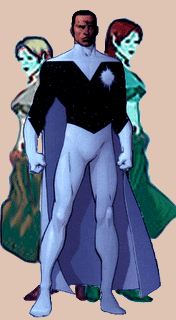|
Rant. Muse. Eat. Sleep. Recycle. |
|

Previous Posts
Fellow Bloggers
Links |
Wednesday, January 31, 2007 On the other side of the debate
Hey guys! I've been busy writing a book, so forgive my silence. But, as ever, I always troll the conservative blogosphere to see what they're doing over there. Some of you may know my... feelings for Ward Connerly. But, the following guy is a real piece of work. He denies being a racist, which I love because my "racistdar" suggests otherwise. He's a more polished David Duke in my opinion because my white friends look at me and say, 'Yeah, but he's got a point.' He's an attorney, of course he makes it appear like he has a point. Smoke and mirrors. His main argument is slipped in like the legalese on a car commercial -- fast and low. According to this guy -- there is no racism in America. Or, wait, there is, but we can't count on institutions like, oh, colleges! to remedy them. What can you get from college, except a better way of life, a higher paying job and an uplift for underrepresented races? Wait, scratch that last part... herewith, the confident, the assured, the slimy.. Mr. Roger Clegg.
The Race Speech President Clinton Should Have Given By Roger Clegg On June 14, 1997, President Clinton spoke to the graduating class at the University of California at San Diego, and to the nation, on the subject of race. In that speech, the President defended the use of racial preference policies, and announced the formation of a commission to study the nation's continuing racial problems. The Commission is chaired by Dr. John Hope Franklin, an historian, and is comprised of individuals generally sympathetic to the President's views on race and the government's role in addressing the problems often associated it. Roger Clegg of the Center for Equal Opportunity below presents an alternative address that might have been given by the President. I am delighted to be here today at the University of California at San Diego. Thank you for inviting me to be part of your graduation ceremony. Let me begin with an apology. I have been promising a speech on the topic of race relations, but I recognize now that I should not have. Daniel Patrick Moynihan urged years ago that race relations in this country could benefit most from a period of "benign neglect." He was criticized for saying so, but he was right then; we have never had that period of benign neglect, and we should not have it now. We also don't need yet another blue-ribbon commission on race -- when I first suggested the appointment of such a commission, I had forgotten that the nation already funds a Civil Rights Commission. Nor do we need more town hall meetings, or anything of that kind. When it comes to quantity, we have plenty of discussion of civil rights issues. Rather, it's quality that the discussion lacks. So let me make just three brief points today, and then let you celebrate your graduation with your families. First, race relations in this country are good, have never been better, and are improving. We have made enormous progress in a very short period of time. Not so very long ago we had government-enforced, official, institutionalized racism in large parts of this country. But such systematic discrimination no longer exists. Not only are our public schools not segregated, but they teach that it is wrong to discriminate on account of race. We have passed laws, and we enforce those laws, making it illegal for governments to discriminate, and for private parties to do so as well, in virtually every public transaction: voting, employment, public accommodations, contracting, housing, credit, and so on. It is no longer socially acceptable to be a racist. There has never been less discrimination in more areas than there is now. There are those who will say that I am "in denial." No. It is those who refuse to recognize the progress that has been made who are in denial. Does this mean that there is no longer any racism or discrimination? Of course not. And this is my second point. There is still racism in America, and there is still discrimination. But the government cannot do much more about these problems than it has already done. The racism that remains must be addressed by all of us -- black and white, Asian and Hispanic, American Indian and immigrant -- in our hearts. While it is often very tempting to generalize about people based on the color of their skin, it is wrong to do so. All of us must resist that temptation. But how will we end this temptation? This brings me to my third point, which is a hard one to make without offending people. But it must be said. Although I have said that racism is not a major national problem anymore, other major national problems do exist. Illegitimacy, drug use, and crime are among them. These are not just problems for minorities, but for nonminorities too. But we know that these problems are worse for our urban black poor than for other groups. Worse because the problems disproportionately afflict this group, and worse because their impact is greater on the poor than on the well-to-do. We must admit the fact that it is the urban black poor who bear a disproportionate number of our fatherless children; who buy sell, use, and become addicted to illegal drugs [Jae note: By any study except those done by conservative groups, this is patently untrue; and who commit violent crimes -- and we must admit that it is this fact that accounts for much of the remaining racism that exists in our country. To get rid of racism, we must get rid of the pathologies afflicting so many low income, urban communities. Americans will disagree on the role that government can play in addressing these problems in our inner cities. But ultimately the best solutions will come from these communities themselves. And because, at their root, these are all moral problems, it should be obvious what institution can play the most important role in solving them. That institution is the inner city church. More and more people, from both ends of the political spectrum, are coming to this conclusion. And I believe they are right. I leave you graduates with this exhortation -- that each of you ask what you can do to help these churches. You are young, and may not have a lot of money now, but you can still volunteer your time. As you get older, and have paid off your student loans, don't forget the often lonely struggle in which these churches are locked. In sum: be proud of the way America now treats all its racial groups; do your part and judge your fellow citizens by the content of their character rather than the color of their skin, and do what you can to help our inner city churches as they fight the problems that are our real enemies. Congratulations and the best of luck to you all. 2 Comments:
Want to Post a Comment? |



